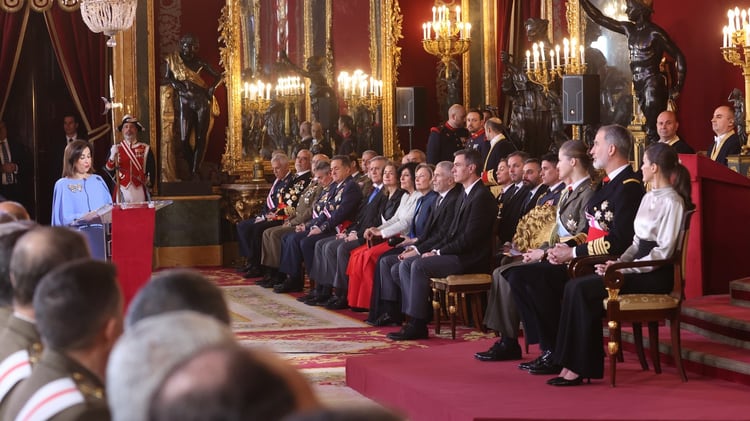The Diplomat
The government insisted yesterday on demanding Israel to call for a ceasefire in Gaza and respect for international humanitarian law. It did so, through the Minister of Defence, Margarita Robles, during her speech at Military Easter.
Robles’ words come just a couple of days after Israel announced the return to Spain next week of its ambassador to Madrid, Rodica Radian-Gordon, who had been recalled for consultations at the end of November due to the Spanish government’s criticism of the offensive launched by Netanyahu’s government on the Gaza Strip following the Hamas attacks of 7 October.
In the presence of the King and the President of the Government, Pedro Sánchez, and before the heads of the Spanish Armed Forces, the Minister of Defence assured, in relation to the wars in Gaza and Ukraine, that Spain is a country that is “firmly committed” to peace in the world.
Robles also stressed that “in the face of wars, conflicts and any kind of unjust violence, we cannot be indifferent”. “There is no room for silence in the face of violations of the basic principles and rules of International Humanitarian Law, or of the United Nations Charter, wherever they occur,” she added.
Reaffirming the position maintained by the Spanish government in relation to the conflict in Gaza, the minister stressed: “We condemn and will condemn the violations of International Humanitarian Law in Gaza and we call forcefully for an immediate and permanent ceasefire”.
Likewise, Robles once again condemned Russia’s “illegitimate, unjust and cruel” aggression in Ukraine and guaranteed that Spain will continue to support the Ukrainians in “their struggle for independence and sovereignty”.
The search for peace is, in Robles’ opinion, a priority and the commitment of the Armed Forces (FAS) to this task is “total and absolute” in all the places where they are deployed.
“With total dedication, we will continue our historic commitment to peace, diplomacy, cooperation and the peaceful resolution of conflicts, as well as to the protection of democratic values at a critical time for global stability,” she said.
In her speech to the military leadership, she made no mention of the international naval mission in the Red Sea, announced by the United States, and in which Spain has not yet announced its participation.
However, she insisted that Spain has always shown itself to be “a serious, responsible and committed ally” in all the operations abroad in which it takes part.
The King’s words
At the ceremony, which was also attended for the first time by the Princess of Asturias, who is currently training at the General Military Academy in Zaragoza, the King praised the role of the Armed Forces in defence of “the framework of coexistence democratically elected by the Spanish people”.
He also praised Spain’s participation in missions abroad, which project “stability”, as “the best example” of Spain’s commitment to international peace and security, in the context of the instability generated by the conflicts in Ukraine and Israel and Hamas.
After making special mention of the 3,000 men and women deployed in the 17 operations abroad in which Spain participates, the Monarch affirmed: “The participation of the Spanish military in the reinforcement of NATO’s deterrence and defence actions, with which they contribute to the security and protection of our allies on the Eastern European flank, and the EU and UN missions, with which they project stability in different geographical areas, are the best proof of Spain’s commitment to international peace and security”.
For his part, in a message on the social network X, the President of the Government expressed his gratitude for the “professionalism” and “commitment” of the Armed Forces “to the defence of Spain and in favour of peace”. He also thanked them for their work in favour of “stability and international humanitarian aid”.






